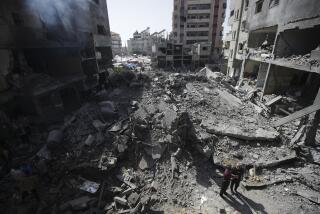Croat, Muslims Face U.N. Tribunal
- Share via
THE HAGUE — The U.N. war crimes tribunal for the Balkans opened its third trial Monday, with a prosecutor accusing four defendants of murdering, raping and committing other violent crimes against Bosnian Serbs.
It marked the first time that Muslims and Croats have been brought into international court for crimes against Serbs during the Balkan wars.
And it was an opportunity for the International Criminal Tribunal for the Former Yugoslavia to refute charges that it is biased against Serbs, who make up the bulk of the 74 men currently under indictment. In this case, three of the defendants are Bosnian Muslims and the fourth is a Bosnian Croat.
Critics of the tribunal also have complained that it is wasting firepower on petty criminals while the main quarries--Bosnian Serb leader Radovan Karadzic and his military commander, Gen. Ratko Mladic--remain at large. But the defendants in the new trial represent an entire spectrum of command authority for one local area.
The most senior of the defendants, Zejnil Delalic, 48, became the coordinator of Muslim and Croatian forces in his home region, Konjic, in southern Bosnia-Herzegovina in 1992. (Muslims and Croats were fighting together at the time against the Bosnian Serbs.)
Under Delalic in the power structure was Zdravko Mucic, 41, a Bosnian Croat who commanded Celebici, a local detention camp for about 500 Bosnian Serbs. Mucic’s deputy at the camp was Hazim Delic, a 32-year-old Muslim. He took over as commander in the final weeks of the camp’s operation.
The fourth defendant, Esad Landzo, 23, was a low-ranking guard at the Celebici camp. He had no authority over any subordinates and compares, in his level of responsibility, with the two defendants the tribunal has tried so far: a low-grade paramilitary operative named Dusan Tadic, and a private in the Bosnian Serb army named Drazen Erdemovic. Tadic’s verdict is expected in April. Erdemovic was sentenced to 10 years imprisonment in November.
With the four new defendants, the tribunal hopes to break significant ground in the area of humanitarian law known as “command responsibility.”
“The concept of command responsibility will be argued at length by both the parties” in the trial, predicted tribunal spokesman Christian Chartier.
At issue will be whether a military officer or civilian can be punished for crimes committed by his subordinates. It is a question that has rarely been addressed by civilian courts since the close of the trials held at Nuremberg and Tokyo after World War II.
The tribunal’s prosecutors hope to show that commanders are culpable even for atrocities they didn’t specifically order because their positions oblige them to know what their subordinates are doing and to prevent and punish crimes.
Any precedent the Celebici case establishes in this area will be applied to future cases involving higher commanders--particularly Karadzic, should he ever end up in the defendant’s dock here in The Hague.
*
Another significant aspect of the Celebici case is expected to be its treatment of sexual violence as a war crime. Some have suggested that wartime rape usually goes unpunished because it is seen as nearly impossible to prevent or prosecute.
Social attitudes have changed, however, and the tribunal’s consideration of sexual assault now--as both a grave breach of the conventions of war and a crime against humanity--represents an attempt to build some case law around this new thinking.
In addition to the rape charges, the Celebici indictment cites incidents in which men were allegedly forced to commit sexual acts with other men or whose private parts were subject to torture.
The four defendants, all of whom say they are innocent, are accused of either personally taking part in acts of torture--some of which were fatal--or of being responsible for them. The indictment is a gruesome list: Inmates, many of them elderly, were allegedly beaten with wooden planks, baseball bats, chains, pieces of steel cable and shovels; burned with hot knives and pincers; set on fire; and had designs carved on their bodies.
More to Read
Sign up for Essential California
The most important California stories and recommendations in your inbox every morning.
You may occasionally receive promotional content from the Los Angeles Times.













